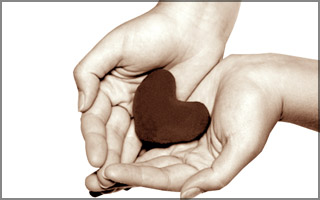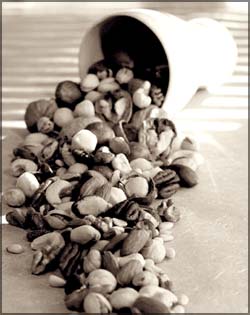
Happy hearts are healthier
The
way a crow Shook down on me The dust of snow From a hemlock treeHas
given my heart A change of mood And save some part Of a day I had rued.
Like in this 1923 work titled "Dust of Snow" by Robert Frost, poets
throughout history have continued to pay homage to the notion that
emotions and the heart are inextricably intertwined.
 Indeed, research suggests that there's a very strong connection
between emotional health and heart health. Negative emotions - anger,
guilt and hostility - can put you at high risk of coronary heart
disease, stroke and even sudden death. Indeed, research suggests that there's a very strong connection
between emotional health and heart health. Negative emotions - anger,
guilt and hostility - can put you at high risk of coronary heart
disease, stroke and even sudden death.
Here's why: Negative emotions cause elevated levels of C-reactive
protein, which is associated with inflammation. Inflamed blood vessels
set the stage for hardening of the arteries (atherosclerosis), says
cardiologist Stephen Sinatra, M.D., founder of the New England Heart and
Longevity Center in Manchester, Conn. Inflamed patches become "sticky"
and start collecting plaque.
Even if you think you're doing all the right things - including
eating a healthful diet and exercising regularly - you could still be
exposing yourself to a significant risk factor for heart disease if you
neglect your mental health.
"There's a plethora of research on emotion and its connection to
heart disease. This connection has been validated over the last 30
years," says Sinatra, who encourages his patients to tap into - and
manage - their negative emotions as part of their heart health program.
"A good cardiologist who really understands what causes heart disease
will always embrace the emotional aspects of a person's being," he adds.
Dealing with emotional distress is as important as reducing your
cholesterol and keeping your blood pressure in check. What's the best
way to get a handle on your negative emotions? Sinatra suggests you try
these 7 tips:
1. Connect with a pet. Pets don't harbour anger or hostility. "We can
all learn from pets," Sinatra says. "If they sit still, so should you.
If they stretch, you should, too. Take in their unconditional love. It
will help to diffuse anger, rage and hostility, all of which can hurt
your heart. You can't feel overwhelming love for something and also be
resentful at the same time. That's why connection with pets is very
vital."
2. Release your emotions. If you feel sadness, humiliation or shame,
it's time to cry. In fact, it's one of the best things you can do for
your heart, he says. One study shows that men and women who don't cry
are more prone to heart disease than men and women who do cry.
If you feel anger, release it by screaming in your car (make sure the
windows are rolled up) or by hitting a punching bag or tennis balls with
a racquet, making sounds as you do. "If you want to put the face of the
person who angered you on the ball, that's fine, too."
3. Laugh. Laughter is also great for your heart. It releases
endorphins, which are natural opiates of the body and are very calming.
If you laugh hard enough, you might even cry, which is a double bonus,
Sinatra says.
"People usually feel better after a good laugh or cry. That's because
both are very good for your heart."
4. Take a walk. Walking is one of the best forms of exercise to "take
you out of your head," he says. When you walk, you might notice a bird
or some subtlety of the natural environment that could change your mood
for the better. Jogging or running can work as well, but if you're not
accustomed to high-intensity exercise, Sinatra urges caution: Vigorous
physical activity can cause blood pressure to rise temporarily. "And if
your emotions are powerful enough, you can cause your blood pressure to
soar dangerously high, which can lead to a cardiac event," including a
heart attack. If you have hypertension or other heart-disease risk
factors, talk to your doctor about the safety of high-intensity
exercise.
5. Engage in a relaxing activity. Consider listening to classical
music or engaging in meditation, tai chi or yoga. These activities "will
assuage [pacify] the sympathetic nervous system" and thereby keep your
blood pressure in check, Sinatra says. "Any of these activities are
fine, but remember, no one thing works for everyone. You have to try
different things until you find one that works for you."
6. Reach out to others. When you're sad, angry or depressed, reach
out to friends, family, co-workers, a therapist or clergy. Share your
feelings, and tell the person how they can help you. Social support is
particularly critical for overcoming feelings of depression and
isolation during recovery from a heart attack, he says.
7. Reconnect with an old joy. When you're feeling angry or upset,
remember a day when you felt joyful in your life - your first kiss, the
birth of your first child, an A on your report card. If you recall such
a moment during times of emotional duress, your stress is much more
likely to disappear, Sinatra says. He adds: "One of the most joyful days
I ever had was when I was 16 and my mother hugged me.
On days I'm upset, I think about that heartfelt hug, and I feel the
anger and stress dissolve.
The heart has a memory of joyful experience that will overwhelm any
negative feelings you have."
revolutionhealth.com
************
Cooking tips to save your heart and waist.
Trying to find healthier ways to cook will make a big difference in
terms of your caloric intake and your cholesterol levels. Here are a few
tips to help you. Baby steps to a healthier lifestyle make the
transition easy!
 No, you don't have to steam everything and have tasteless food but
here are some ideas to help you learn ways to switch around your
favourite dishes so that they're more figure and heart friendly. No, you don't have to steam everything and have tasteless food but
here are some ideas to help you learn ways to switch around your
favourite dishes so that they're more figure and heart friendly.
Bake instead of fry
Wherever possible, bake foods that typically call for frying. Use
pans that allow grease to escape. For example, cook burgers on a broiler
pan that lets the meat sit above the grease. Burgers are juicy enough to
not need to cook in their own grease.
Bake breaded chicken breasts and chicken wings instead of frying or
deep frying. A bit of healthy oil or cooking spray on the food can help
the flavour taste similar to fried without having the same amount of
calories or release of trans fatty acids.
Choose healthier oils
When you choose to fry, choose healthier oils to use. Coconut oil is
fast becoming a very popular choice for healthier eating because it has
so many health benefits and because it has a higher melting point which
means trans fatty acids don't get released and food gets fried to a
golden brown because the oil doesn't burn. A pat of coconut oil is also
great in the oven on top of some meat or vegetables. Coconut oil is
figure friendly.
Olive oil is another healthy choice and olive oil is an anti
inflammatory food so great for heart health as well as for your skin and
it contains many healthy benefits.
Cook a rainbow
The more colourful your food, the better the chances you're eating
something healthy. Aim to get several colours on your plate at every
meal and fill the plate with larger servings of vegetables while also
reducing your meat and starch serving. Vegetables fill you up, are great
for your digestive system and provide healthy free radical fighting
antioxidants.
healthynews.com
************
Eat more nuts
Here's a health tip in a nutshell: Eating a handful of nuts a day for
a year - along with a Mediterranean diet rich in fruit, vegetables and
fish - may help undo a collection of risk factors for heart disease.
Spanish researchers found that adding nuts worked better than
boosting the olive oil in a typical Mediterranean diet. Both regimens
cut the heart risks known as metabolic syndrome in more people than a
low-fat diet did.
 "What's most surprising is they found substantial metabolic benefits
in the absence of calorie reduction or weight loss," said Dr. JoAnn
Manson, chief of preventive medicine at Harvard's Brigham and Women's
Hospital. "What's most surprising is they found substantial metabolic benefits
in the absence of calorie reduction or weight loss," said Dr. JoAnn
Manson, chief of preventive medicine at Harvard's Brigham and Women's
Hospital.
In the study, appearing Monday in the Archives of Internal Medicine,
the people who improved most were told to eat about three whole walnuts,
seven or eight whole hazelnuts and seven or eight whole almonds. They
didn't lose weight, on average, but more of them succeeded in reducing
belly fat and improving their cholesterol and blood pressure.
Manson, who wasn't involved in the study, cautioned that adding nuts
to a Western diet - one packed with too many calories and junk food -
could lead to weight gain and more health risks. "But using nuts to
replace a snack of chips or crackers is a very favourable change to make
in your diet," Manson said.
The American Heart Association says 50 million Americans have
metabolic syndrome, a combination of health risks, such as high blood
pressure and abdominal obesity.
Finding a way to reverse it with a diet people find easy and
satisfying would mean huge health improvements for many Americans,
Manson said.
Nuts help people feel full while also increasing the body's ability
to burn fat, said lead author Dr. Jordi Salas-Salvado of the University
of Rovira i Virgili in Reus, Spain."Nuts could have an effect on
metabolic syndrome by multiple mechanisms," Salas-Salvado said in an
e-mail.
Nuts are rich in anti-inflammatory substances, such as fibre, and
antioxidants, such as vitamin E. They are high in unsaturated fat, a
healthier fat known to lower blood triglycerides and increase good
cholesterol.
More than 1,200 Spaniards, ranging in age from 55 to 80, were
randomly assigned to follow one of three diets. They were followed for a
year. The participants had no prior history of heart disease, but some
had risk factors including Type 2 diabetes, high blood pressure and
abdominal obesity.
At the start, 751 people had metabolic syndrome, about 61 percent,
distributed evenly among the three groups.Metabolic syndrome was defined
as having three or more of the following conditions: abdominal obesity,
high triglycerides, low levels of good cholesterol (HDL), high blood
sugar and high blood pressure.
The low-fat group was given basic advice about reducing all fat in
their diets. Another group ate a Mediterranean diet with extra nuts. The
third group ate a Mediterranean diet and was told to make sure they ate
more than four tablespoons of olive oil a day.
Dietitians advised the two groups on the Mediterranean diet to use
olive oil for cooking; increase fruit, vegetable and fish consumption;
eat white meat instead of beef or processed meat; and prepare homemade
tomato sauce with garlic, onions and herbs. Drinkers were told to stick
with red wine.After one year, all three groups had fewer people with
metabolic syndrome, but the group eating nuts led the improvement, now
with 52 percent having those heart risk factors. In the olive oil group,
57 percent had the syndrome.
In the low-fat group, there was very little difference after a year
in the percentage of people with the syndrome.The nut-rich diet didn't
do much to improve high blood sugar, but the large number of people with
Type 2 diabetes - about 46 percent of participants - could be the
reason, Salas-Salvado said. It's difficult to get diabetics' blood sugar
down with lifestyle changes alone, he said.
To verify that study volunteers ate their nuts, researchers gave some
of them a blood test for alpha-linolenic acid found in walnuts.The study
was funded by the Spanish Ministry of Health and the government of
Valencia, Spain.
Salas-Salvado and another co-author disclosed in the publication that
they are unpaid advisers to nut industry groups. Salas-Salvado said all
of their research "has been conducted under standard ethical and
scientific rules" and that peer-review journal editors determined the
study results were not influenced by food industry ties.
newsweek.com
Bacteria and bad breadth
"Bad Breath is due to a bacterial imbalance of the biofilms of the
mouth and throat".
What do I mean by this. Well we all have biofilms (coatings) that
build up every day on all surfaces of the mouth, but specifically the
tongue surface, teeth, gums and throat area. When the coatings are new
they have very few bacteria inside them and cause no troubles. However
if the biofilms are not removed twice a day then they become a breeding
ground for the opportunistic bacteria that cause bad breath.
Once inside the biofilms, the bacteria will break down proteins to
amino acids and a smelly waste product called volatile sulphur
compounds. These waste sulphur compounds can then become absorbed by the
saliva causing not only bad breath but also a bad taste in the mouth
should the waste sulphur compounds originate from the biofilm of mucous
at the back of the throat then you will also be able to smell the bad
breath.
Bacteria and biofilm are natural occurrences of the mouth and throat,
but we must work hard at keeping them healthy. A similar analogy would
be that of a river. A fast flowing stream does not get stagnant water
and weed overgrowth, yet a stagnate pool often is infected by virulent
weeds and bacteria. The mouth is the same. If the biofilm is cleaned
twice a day and then allowed to regrow, it generally grows healthy,
however if it is allowed to stay and stagnate, it generally becomes
infected with pathogenic and opportunistic mouth and throat bacteria.
It is this biofilm theory that Dr. Speiser has been developing in his
Australian Breath Clinic with great success.
The clinic protocol is to avoid the use of harsh antibacterial
chemicals and to focus on biofilm cleansers that will remove the biofilm
in total taking the bacteria away with the cleaning. This biofilm
protocol is called our KForce Balance System; a five day intensive
program that utilises cleansers to remove old biofilms and opportunistic
bacteria and allow the growth of a new and healthy biofilm and bacteria,
that will promote mouth health and fresh breath.
A good sign of a healthy biofilm is the clean neutral taste one gets
in their mouth after using the KForce Balance System.
brezecare.com. |
